program that is stimulating and helps your child discover and develop new skills and not just act as adult babysitters.
Most of the adult care system is funded through Social Security and Medicaid. Your child will need to be enrolled in these funding streams, if they are going to access most adult support services. Your special needs department can provide help on starting the application process.
If you plan to leave funds for your adult child, you need to consult with a special needs attorney.
While it is a subject that we’d rather not think about, we will not be around forever to care for an adult son or daughter with disabilities. Years ago, people with disabilities didn’t have long lives, but now with improvements in medical treatments and other innovative care practices, they are likely to have more typical lifetimes. It helps to start thinking about future planning early, since many state support systems have long waits for residential supports, whether that be shared living, independent apartments, or group residences. My wife and I had to go through this tough decision process six years ago, when it was clear that as we approached our seventies, caring for Jessica’s physical needs would be more difficult. We found an accessible group residence for her, and she seems happy there. Through the miracle of FaceTime and regular monthly visits home with us, everything has worked out better than we expected.
If you feel your adult child has the capability to manage their personal affairs, then there are person-centered services such as shared decision making, that can help them manage their finances
and major life decisions. If the individual has challenges in managing their affairs, you may consider having a guardian appointed to help them. Just because you are their parent, that doesn’t make you their legal guardian after they turn eighteen. Explore this with your high school’s special needs department. Due to the asset limitations established by Social Security and Medicare, the person with a disability is limited to the amount of assets that they can hold. If you plan to leave funds for your adult child, you need to consult with a special needs attorney to ensure that their benefits will be protected by a Special Needs Trust or other legal protections, so those funds won’t be included in the person’s asset base.
When you raise a child with disabilities, you have a lifetime of commitment and advocacy ahead of you. Appreciate what you do for them by being kind and generous to yourself. Tap into your support network of family and friends. It's a journey that others have traveled before you. Learn from them and pass your knowledge on to the next generation of "Exceptional Parents." •
ABOUT THE AUTHOR:
Jordan Jankus is the proud father of Jessica, his adult daughter who was born with multiple developmental delays. In addition to his role as a parent, Jordan has worked in human support services for twenty-three years as a case manager, employment specialist, self-advocacy trainer and assistive technology specialist. From his life experience, Jordan provides his thoughts on the critical subject of Transition. You can read more of Jordan Jankus' writings on the world of disabilities, parenting, lifelong learning, and technology at his Substack blog, "Plastic Learning" plastlearn.substack.com
